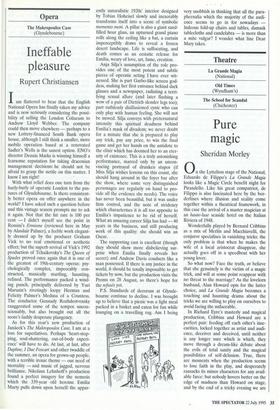Opera
The Makropoulos Case (Glyndebourne)
Ineffable pleasure
Rupert Christiansen
Iam flattered to hear that the English National Opera has finally taken my advice and is now seriously considering the possi- bility of selling the London Coliseum to Andrew Lloyd Webber. The company could then move elsewhere — perhaps to a new Lottery-financed South Bank opera house, although I still think a smaller, more mobile operation based at a renovated Sadler's Wells is the sanest option. ENO's director Dennis Marks is winning himself a fearsome reputation for taking draconian management decisions: he should not be afraid to grasp the nettle on this matter. I know I am right!
With what relief does one turn from the hurly-burly of operatic London to the pas- tures of Glyndeboume. Is there consistent- ly better opera on offer anywhere in the world? I have asked such a question before and this vintage season prompts me to ask it again. Not that the hit rate is 100 per cent — I didn't myself see the point in Rossini's Ermione (reviewed here in May by Alasdair Palmer), a feeble work elegant- ly dressed up by the producer Graham Vick to no real emotional or aesthetic effect; but the superb revival of Vick's 1992 production of Tchaikovsky's The Queen of Spades proved once again that it is one of the greatest of 19th-century operas: psy- chologically complex, impeccably con- structed, musically startling, haunting, refined. The performance packed a wind- ing punch, principally delivered by Yuri Marusin's rivetingly loopy Herman and Felicity Palmer's Medusa of a Countess. The conductor Gennady Rozhdestvensky exaggerated some of the tempos uncon- scionably, but also brought out all the score's lushly desperate plangency.
As for this year's new production of Janacek's The Makropoulos Case, I am at a loss for superlatives. Perhaps 'heart-stop- ping, soul-shattering, out-of-body experi- ence' will have to do. At last, at last, after Daphne, I Due Foscari and other twaddle of the summer, an opera for grown-up people, with a terrible ironic theme — our need of mortality — and music of jagged, nervous brilliance. Nikolaus Lehnhoffs production found a perfect imagery for the nemesis which the 339-year old heroine Emilia Marty pulls down upon herself: the appar- ently naturalistic 1920s' interior designed by Tobias Hoheisel slowly and inexorably transforms itself into a scene of symbolic memento mori. A pillar is also a giant sand- filled hour glass, an upturned grand piano rolls along the ceiling like a bat, a curtain imperceptibly draws to reveal a frozen desert landscape. Life is suffocating, and death comes as an ecstatic release for Emilia, weary of love, art, fame, creation.
Anja Silja's assumption of the role pro- vides one of the most potent and subtle pieces of operatic acting I have ever wit- nessed. She is part Garbo-like screen god- dess, making her first entrance behind dark glasses and a newspaper, radiating a terri- fying sexual allure (and later flashing a wow of a pair of Dietrich slender legs too); part ruthlessly disillusioned cynic who can only play with human feeling. She will not be moved. Silja conveys with preternatural intensity this spiritual deadness behind Emilia's mask of divadom; we never doubt for a minute that she is prepared to play any trick, pay any price, to win the final game and get her hands on the antidote to the elixir which has doomed her to an eter- nity of existence. This is a truly astonishing performance, marred only by an uncon- vincing portrayal of drunken stupor (if Miss Silja wishes lessons on this count, she should hang around in the foyer bar after the show, where some very distinguished personages are regularly on hand to pro- vide all the evidence she needs). The voice has never been beautiful, but it was under firm control, and the note of stridency which characterises it is all too apposite to Emilia's impatience to be rid of herself. What an amazing career Silja has had —40 years in the business, and still producing work of this quality: she should win an Oscar.
The supporting cast is excellent (though they should show more disbelieving sur- prise when Emilia finally reveals her secret) and Andrew Davis conducts like a man possessed. If there is any justice in the world, it should be totally impossible to get tickets by now, but the production visits the Proms on 28 August, so there's hope for the refuses yet.
P.S. Standards of decorum at Glynde- bourne continue to decline. I was brought up to believe that a picnic was a light meal packed in a basket and eaten for fun while lounging on a travelling rug. Am I being very snobbish in thinking that all the para- phernalia which the majority of the audi- ence seems to go in for nowadays — hideous fold-up chairs and tables, damask tablecloths and candelabra — is more than a mite vulgar? I wonder what line Dear Mary takes.


















































 Previous page
Previous page